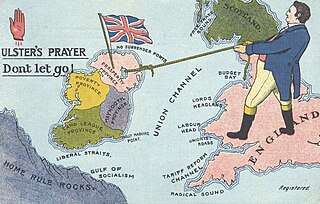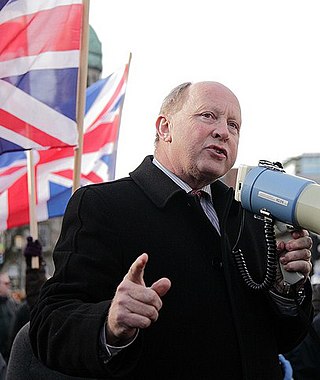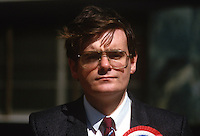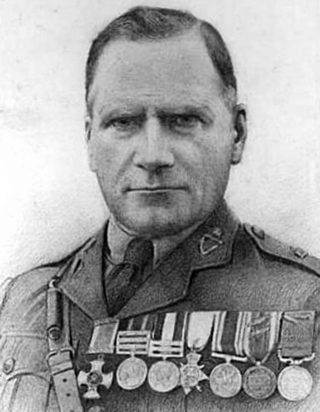Related Research Articles

The Ulster Unionist Party (UUP) is a unionist political party in Northern Ireland. The party was founded as the Ulster Unionist Council in 1905, emerging from the Irish Unionist Alliance in Ulster. Under Edward Carson, it led unionist opposition to the Irish Home Rule movement. Following the partition of Ireland, it was the governing party of Northern Ireland between 1921 and 1972. It was supported by most unionist voters throughout the conflict known as the Troubles, during which time it was often referred to as the Official Unionist Party (OUP).

Ian Richard Kyle Paisley, Baron Bannside, was a loyalist politician and Protestant religious leader from Northern Ireland who served as leader of the Democratic Unionist Party (DUP) from 1971 to 2008 and First Minister of Northern Ireland from 2007 to 2008.

Unionism in Ireland is a political tradition that professes loyalty to the crown of the United Kingdom and to the union it represents with England, Scotland and Wales. The overwhelming sentiment of Ireland's Protestant minority, unionism mobilised in the decades following Catholic Emancipation in 1829 to oppose restoration of a separate Irish parliament. Since Partition in 1921, as Ulster unionism its goal has been to retain Northern Ireland as a devolved region within the United Kingdom and to resist the prospect of an all-Ireland republic. Within the framework of the 1998 Belfast Agreement, which concluded three decades of political violence, unionists have shared office with Irish nationalists in a reformed Northern Ireland Assembly. As of February 2024, they no longer do so as the larger faction: they serve in an executive with an Irish republican First Minister.

The Anglo-Irish Agreement was a 1985 treaty between the United Kingdom and the Republic of Ireland which aimed to help bring an end to the Troubles in Northern Ireland. The treaty gave the Irish government an advisory role in Northern Ireland's government while confirming that there would be no change in the constitutional position of Northern Ireland unless a majority of its citizens agreed to join the Republic. It also set out conditions for the establishment of a devolved consensus government in the region.

The Vanguard Unionist Progressive Party (VUPP), informally known as Ulster Vanguard, was a unionist political party which existed in Northern Ireland between 1972 and 1978. Led by William Craig, the party emerged from a split in the Ulster Unionist Party (UUP) and was closely affiliated with several loyalist paramilitary groups. The party was set up in opposition to power sharing with Irish nationalist parties. It opposed the Sunningdale Agreement and was involved in extra-parliamentary activity against the agreement. However, in 1975, during discussions on the constitutional status of Northern Ireland in the constitutional convention, William Craig suggested the possibility of voluntary power sharing with the nationalist Social Democratic and Labour Party. In consequence the party split, with dissenters forming the United Ulster Unionist Party. Thereafter Vanguard declined and following poor results in the 1977 local government elections, Craig merged the remainder of Vanguard into the UUP in February 1978.
The Northern Ireland peace process includes the events leading up to the 1994 Provisional Irish Republican Army (IRA) ceasefire, the end of most of the violence of the Troubles, the Good Friday Agreement of 1998, and subsequent political developments.

James Hugh Allister is a British Unionist politician and barrister in Northern Ireland. He founded the Traditional Unionist Voice (TUV) political party in 2007, leading the party since its formation. Allister has served as a Member of the Northern Ireland Assembly (MLA) for North Antrim since 2011, and is the TUV’s only representative in the Assembly.
The Ulster Unionist Labour Association (UULA) was an association of trade unionists founded by Edward Carson in June 1918, aligned with the Ulster Unionists in Ireland. Members were known as Labour Unionists. In Britain, 1918 and 1919 were marked by intense class conflict. This phenomenon spread to Ireland, the whole of which was part of the United Kingdom at the time. This period also saw a large increase in trade union membership and a series of strikes. These union activities raised fears in a section of the Ulster Unionist leadership, principally Edward Carson and R. Dawson Bates. Carson at this time was president of the British Empire Union, and had been predisposed to amplify the danger of a Bolshevik outbreak in Britain.

Robert Jonathan Bradford was a Methodist Minister and a Vanguard Unionist and Ulster Unionist Member of Parliament for the Belfast South constituency in Northern Ireland until his assassination by the Provisional Irish Republican Army (IRA) on 14 November 1981.
The Ulster Protestant Volunteers was a loyalist and Reformed fundamentalist paramilitary group in Northern Ireland. They were active between 1966 and 1969 and closely linked to the Ulster Constitution Defence Committee (UCDC) and Ulster Volunteer Force (UVF), established by Ian Paisley and Noel Doherty in 1966.

Ulster loyalism is a strand of Ulster unionism associated with working class Ulster Protestants in Northern Ireland. Like other unionists, loyalists support the continued existence of Northern Ireland within the United Kingdom, and oppose a united Ireland independent of the UK. Unlike other strands of unionism, loyalism has been described as an ethnic nationalism of Ulster Protestants and "a variation of British nationalism". Loyalists are often said to have a conditional loyalty to the British state so long as it defends their interests. They see themselves as loyal primarily to the Protestant British monarchy rather than to British governments and institutions, while Garret FitzGerald argued they are loyal to 'Ulster' over 'the Union'. A small minority of loyalists have called for an independent Ulster Protestant state, believing they cannot rely on British governments to support them. The term 'loyalism' is usually associated with paramilitarism.

George Seawright was a Scottish-born unionist politician in Northern Ireland and loyalist paramilitary in the Ulster Volunteer Force. He was assassinated by the Irish People's Liberation Organisation in 1987.

The Loyalist Association of Workers (LAW) was a militant unionist organisation in Northern Ireland that sought to mobilise trade union members in support of the loyalist cause. It became notorious for a one-day strike in 1973 that ended in widespread violence.

The Loyal Orange Institution, commonly known as the Orange Order, is an international Protestant fraternal order based in Northern Ireland and primarily associated with Ulster Protestants. It also has lodges in England, Scotland, Wales and the Republic of Ireland, as well as in parts of the Commonwealth of Nations and the United States.

Ulster Resistance (UR), or the Ulster Resistance Movement (URM), is an Ulster loyalist paramilitary movement established by the Democratic Unionist Party (DUP) in Northern Ireland in November 1986 in opposition to the Anglo-Irish Agreement.
Ulster Protestant Action (UPA) was an Ulster loyalist political party and Protestant fundamentalist vigilante group in Northern Ireland that was founded in 1956 and re-formed as the Protestant Unionist Party in 1966.
Parades are a prominent cultural feature of Northern Ireland. The overwhelming majority of parades are held by Ulster Protestant, unionist or Ulster loyalist groups, but some Irish nationalist, republican and non-political groups also parade. Due to longstanding controversy surrounding the contentious nature of some parades, a quasi-judicial public body — the Parades Commission — exists to place conditions and settle disputes. Although not all parading groups recognise the Commission's authority, its decisions are legally binding.
Down Orange Welfare was an Ulster loyalist paramilitary vigilante group active in Northern Ireland during the 1970s. Operating in rural areas of County Down, the group faded after failing to win support away from larger groups such as the Ulster Defence Association (UDA) and Ulster Volunteer Force (UVF).

The Protestant Coalition was a minor Ulster loyalist political party in Northern Ireland. It was registered on 23 April 2013, and launched on 24 April at a hotel in Castlereagh, outside Belfast. It deregistered in November 2015 without contesting any seat.

Lieutenant ColonelJames Hanna McCormick, was a professional soldier and Ulster Unionist Party politician.
References
- 1 2 3 4 5 Graham Walker, A History of the Ulster Unionist Party: Protest, Pragmatism And Pessimism
- 1 2 3 Michael Farrell, Northern Ireland: The Orange State
- ↑ Oliver P. Rafferty, Catholicism in Ulster, 1603-1983: An Interpretative History
- ↑ Boyd, Andrew (1984), Northern Ireland: Who is to Blame?, The Mercier Press Limited, Dublin, pg 61, ISBN 0 85342 708 9
- ↑ Thorne, Kathleen (2019). Echoes of Their Footsteps Volume Three. Oregon: Generation Organization. p. 80. ISBN 978-0-692-04283-0.
- ↑ "Northern Ireland Parliamentary Election Results: Boroughs: Belfast". Archived from the original on 22 July 2018. Retrieved 28 February 2008.
- ↑ Fearghal McGarry, Irish Politics and the Spanish Civil War